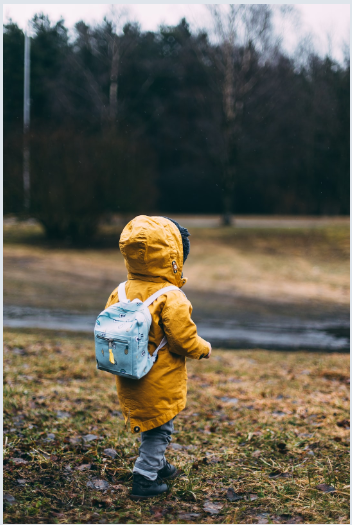Parents and teachers prepare for children born during the COVID-19
pandemic head to preschool this fall.
In early spring 2020, when the COVID pandemic began to take hold,
everyone’s daily routines changed. For many new parents, this meant an
unexpected and sudden loss of much-needed support systems. Holly
Rondeau is the mom of a toddler born in early February 2020, making her son
a pandemic baby. “We had maybe a week or two, and then boom! (The) world
closed down, my mom had to leave early because the airports were closing,
and then we couldn’t see anybody for like a year.” Children born in 2020
experienced isolation during an essential phase of early childhood
development. This fall, these pandemic babies head to preschool.
According to the Oregon Health Authority, there were 39,820 births in 2020.
This fall, an estimated 10,000 of those children will enter preschool. This
number of children is an increase of about 2,000 children from the prior year
due to the inception of the state-funded Preschool Promise program which
provides free or low-cost preschool for eligible 3- and 4-year-olds. Studies
show early childhood education programs, like preschool, are critical for
children in many areas, including academic achievement and future health.
With preschools preparing to take in these pandemic babies for the first time,
there is some apprehension for the parents. Children, especially young
children, learn through play, activities, and interacting with other children their
own age. The forced isolation brought on by the pandemic led to many
children spending their formative years without some of these vital
interactions. The isolation children and families experienced during the
pandemic varied based on factors like family size and location. How this
isolation affected young children’s social skills is likely just as varied. Add in
the dynamic of masking for a year or more, and small children were
challenged even further by not getting social cues learned from reading facial
expressions.
Research studies on how infants and young children fared during the
pandemic are assessing for changes in early development. Unfortunately,
they are finding them. A study published in Japan this month looked at the
effects of screen time on infants and young children. The impact of screen
time is significant because many parents turned to increased screen use
during the pandemic. The Japanese study found the more screen time an
infant had at age 1, the greater the risk of delays in communication and
problem-solving of toddlers at ages 2 and 4. A second study looked at
changes in early childhood development that pandemic babies experienced.
The study found a decline in these children’s communication and personal-
social skills. Parents like Rondeau hope preschool will help provide some of
these lost abilities.
Keri Archer is a kindergarten teacher at Nehalem Elementary. She taught
before, during, and after the pandemic, giving her an excellent perspective on
how little ones do when attending school for the first time. From her
perspective, Archer says the children starting school at the beginning of the
2021-2022 school year were the most impacted by the pandemic. She notes
kindergarteners that year had not attended preschool because of the
pandemic closures and the first graders spent most of their kindergarten year
attempting virtual learning. Archer found a lot of gaps in the children’s
education, and the children lacked an understanding of how to behave or act
in a school setting. “Preschool and kindergarten are the years we are as
human beings learning how to relate to each other,” says Archer. “Typically,
that’s the first group settings that a lot of kids are in…they have to learn how
to get along with each other, and take turns, and play.” But there is hope, as
Archer saw last year as a more typical school year, and she expects the same
this year. Rondeau is ready for this with her son. “I’m excited for him to start
preschool and kind of, like, see this next phase of his development.”
Studies of the effects of isolation on babies who grew into toddlers during the
pandemic will likely be under scrutiny for years. Because of the isolation,
many young children have not had the traditional opportunities to socialize
with other children their age. Archer wants to reassure parents with young
children attending school for the first time. “The encouragement of a parent
goes a long way to help them be successful in school. Because it is always
going to be scary.” The advice Archer would give parents going into the new
school year is the same as she would have given to parents before the
pandemic. “I think the more confident that parents can be about how fun it’s
going to be, and how great it’s going to be, and that encouragement, and just
feeling confident that educators are well versed in what they do and are going
to handle it well so they can feel that confidence too.”
AUTHOR: Leanna Coy, FNP-C, Family Nurse Practitioner and Health Content Writer
Resources:
Takahashi I, Obara T, Ishikuro M, et al. Screen Time at Age 1 Year and Communication
and Problem-Solving Developmental Delay at 2 and 4 Years. JAMA Pediatr. Published
online August 21, 2023. doi:10.1001/jamapediatrics.2023.3057
Almeida, L., Rego, J. F., Girardi Teixeira, A. C., & Moreira, M. R. (2022). Social isolation and its
impact on child and adolescent development: A systematic review. Revista Paulista de
Pediatria, 40. https://doi.org/10.1590/1984-0462/2022/40/2020385
Other wellness questions? Email us at info@tillamookcountywellness.org. For more local health and wellness information, visit www.tillamookcountywellness.org or follow Tillamook County Wellness on Facebook and Instagram.

